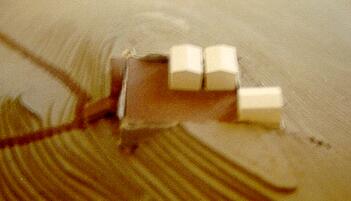| S a n c t u a r y o
f A t h e n a C y n t h i a
a t D e l o s
(Click the image for a full screen view)
The Sanctuary of Athena Cynthia at Delos
The Sacred Island of Delos
According to legend, Leto gave birth to Artemis and Apollo here. The Ionians arrived in about 1000 BCE, bringing the worship of Apollo and founding the annual Delia Festival, during which games and music were played in His honor. By 700 BCE, Delos was a major religious center. First a place of pilgrimage, it later became a thriving commercial port particularly in the 3rd and 2nd centuries BCE. It is now an open-air archeological museum with mosaics and marble ruins covered in wild flowers in spring.
Mount Cynthus
The visitor can climb up eastwards in order to see the Sanctuaries on the summit of mount Cynthus. He follows the best preserved of the three paths which can be seen easily from afar. At the beginning of the street left, on the vertical rock face, is the inscription: Of Athena Organe, a dedication to Athena Ergane, patron Goddess of manual work. A path on the right side of the street leads to the Cynthus cave. A rock-cut stair way leads to the terrace in front of the cave, which is supported by a wall of large blocks of granite. At the center of the terrace, on a granite base, stands a large marble altar with hollow drums-rings of diameter 1.50m. The cave was originally thought to be the age-old Sanctuary of Apollo mentioned in the myth, but was later identified as the Sanctuary of Hercules, created in Hellenistic times (3rd century BCE), within the general climate of returning to nature and more ancient forms of cult. On returning to the main path and ascending towards the mountain, at the end of the stepped street a steep stairway with many steps leads to the summit, where the Cynthion, the Sanctuary of Athena Cynthia and Zeus Cynthius, is located.
The Sanctuary of Athena Cynthia
Only the strong granite foundation of the propylaeum (gate) of the entrance, at one time with four marble Doric columns, is in situ. The Cynthion stood on a square elevated site supported by mighty granite retaining walls. Two rectangular buildings, the Temples of the Gods, or in the view of some scholars simple oikoi (houses) or hestiatoria (dining halls), badly destroyed, face each other next to the north peribolos (wall enclosing the sacred area).
The Cynthion Treasure
Bruneau notes the "modification radicale" of the treasure between 156 and 146 BCE: the single statue is replaced by two, the pinaxes dedicated by Autokles' sons become anonymous; some objects are omitted; others are added. We might add that some cult objects
disappear (table, chairs, krater, trough, doors), but a table and stone
washbasin are added and the arrangement is no longer by locale (under the
influence of one item [D26] being weighed?). Bruneau, following Roussel,
speaks of a renovation of the cult thanks to "dévotion orientale"
and provides considerable supporting evidence.
Tourist Information:
Copyright ©1998-2002 Roy George |

![[Click to enlarge image]](Delos_plan_tn.jpg)
![[Click to enlarge image]](Cynthion_plan_tn.jpg)
![[Click to enlarge image]](Cynthus_from_N_tn.jpg)
![[Click to enlarge image]](Cynthus_from_W_tn.jpg)
![[Click to enlarge image]](Delos_reconstruction_city_center1_tn.jpg)
![[Click to enlarge image]](Delos_reconstruction_city_South_tn.jpg)
![[Click to enlarge image]](Cynthus_from_NW1_tn.jpg)
![[Click to enlarge image]](Cynthus_from_NW2_tn.jpg)
![[Click to enlarge image]](Cynthus_from_NW3_tn.jpg)
![[Click to enlarge image]](Cynthus_from_NW4_tn.jpg)
![[Click to enlarge image]](Cynthion_Steep_street_tn.jpg)
![[Click to enlarge image]](Cynthion_Athena_Ergane_inscription_tn.jpg)
![[Click to enlarge image]](Cynthion_reconstruction_West_tn.jpg)